Vava'u by Car 1

Beez Neez now Chy Whella
Big Bear and Pepe Millard
Tue 12 Nov 2013 22:57
|
Exploring Vava’u in a Tiny
Hire Car - Part One
 We got up this morning to a very
dreary, overcast day, great excitement - a cruise ship came
in. The passengers have from eight am until half past twelve, back on
board for lunch and off at one thirty, talk about whistle
stop........
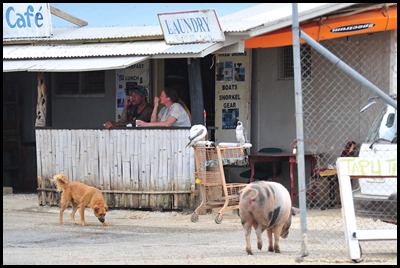
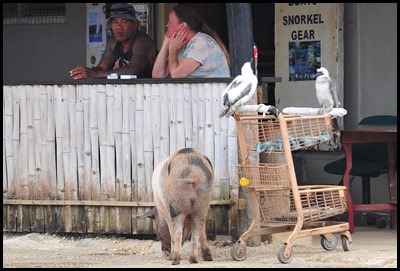 Bear left
me on the quayside and went off to collect the hire car. We can never, ever be
accused of traveling light. When I look at the French on holiday, towel and
book, I feel unnecessarily over prepared. This morning it was two sets of
snorkeling stuff, both in lozenge shaped, purpose built bags and Bear’s is much
heavier than mine. The foldy-up beach blanket, that acts as a back sack,
fur–lined poncho, complete with insect stuff in the pocket. Big back sack full
of cameras, IPad and bits. I’m sitting here looking like I’m going away for a
week. Anyway, settled and waiting, I look up and see a pig trotting into a bar,
complete with two baby frigate
birds on a converted shopping trolley and a couple of people sitting as
if this is a normal day.
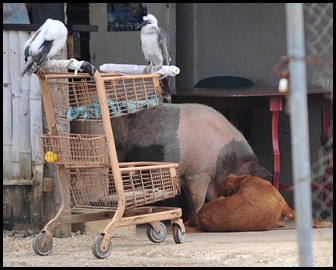
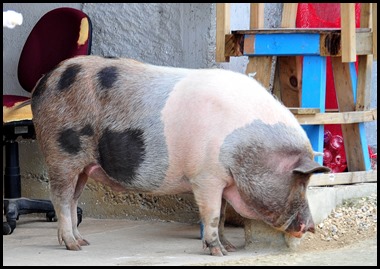 Pig and dog now set about the task of
licking up the fallen bird food. Then it’s time for the porker to have a jolly good
scratch.
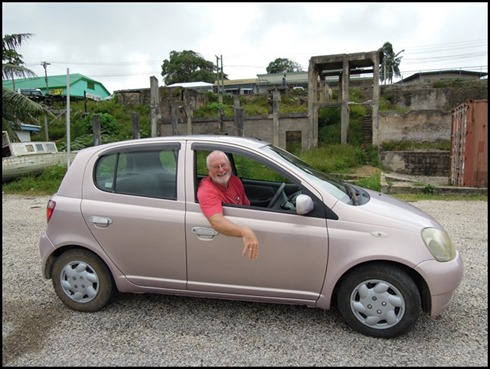 For twenty four pounds I didn’t
expect much. The captain appeared in quite a smart little
Toyota – Oh, but such a dodgy colour. Now starting to rain, I feel the
snorkel / beach arrangement may not be required. Oh
well at least we have it. Yes dear. Jumping into the car I’m given
the large, plasticised map. Totally useless as there are no road signs, we’ll do
what we usually do and go around the edge and zig zag. Oh,
I’ve been asked to stay on the main roads, is there much of a
difference. No. Rightee
oh then.
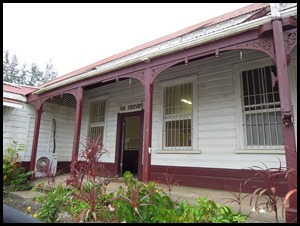 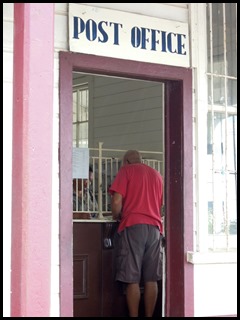
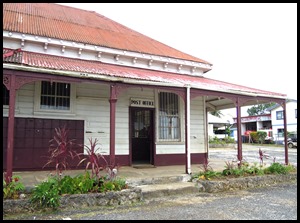 First stop is the
Post Office to get Lady Mac a pair of stamps. This is next to the Sub Treasury. The whole ensemble would like quite in
keeping on the set of a western and I fully expected a cowboy in spurs to exit
at any moment.
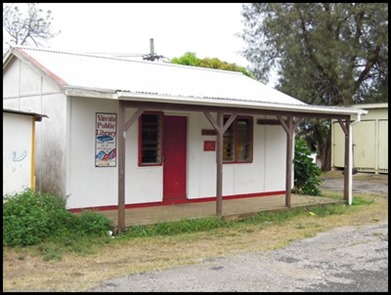 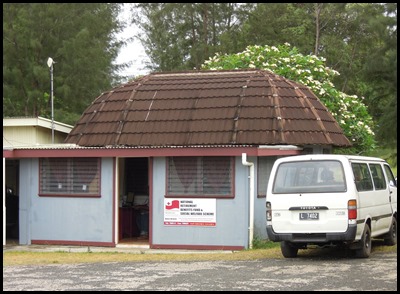 Opposite was
Vava’u Library and to my left the Office for
Pensions.
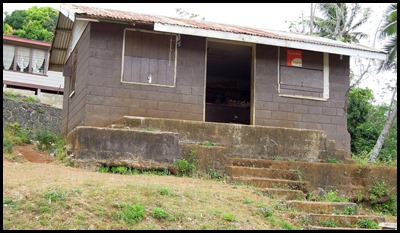
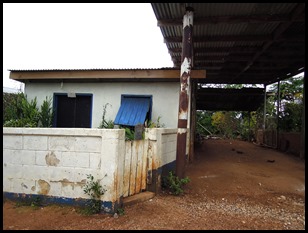 Up the hill we pass a couple of supermarkets, yes, both of
these........
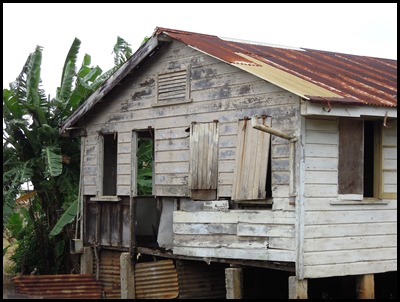 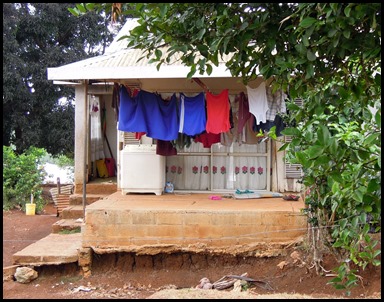 We usually feature ‘One Careful
Owners’ that are not lived in, but here they all were functioning as housing.
Tonga's economy is characterised by a
large nonmonetary sector and a heavy dependence on remittances from the half of
the country's population that lives abroad, chiefly in Australia, New Zealand,
and the United States. Much of the monetary sector of the economy is dominated,
if not owned, by the royal family and nobles. This is particularly true of the
telecommunications and satellite services. Much of small business, particularly
retailing on Tongatapu, is now dominated by recent Chinese immigrants who
arrived under a cash-for-passports scheme that ended in 1998.
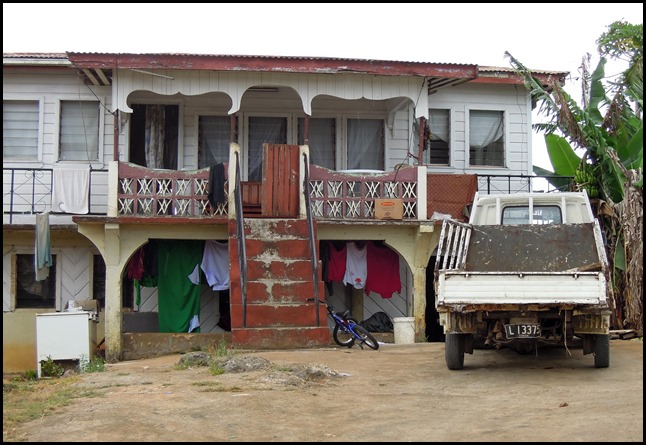 This was the
smartest house we saw all morning.
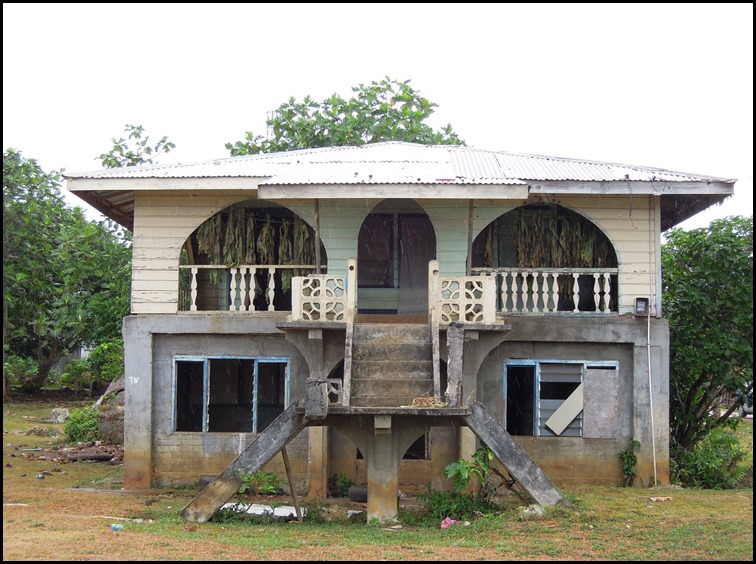 The
shabbiest, but beautiful church music was blaring out from the upper
floor. Needless to say ‘One Careful Owners’ came at us thick and fast (own blog
of course), but here we felt a deep sense of oh dear about it all.
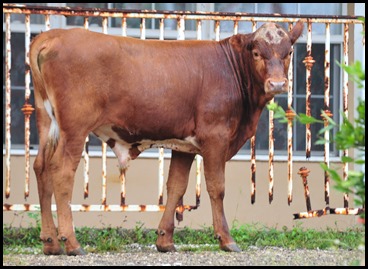 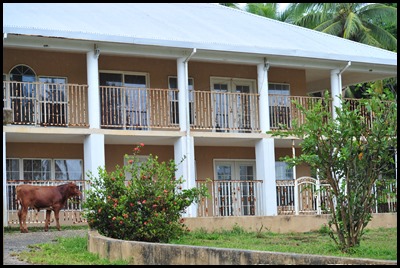 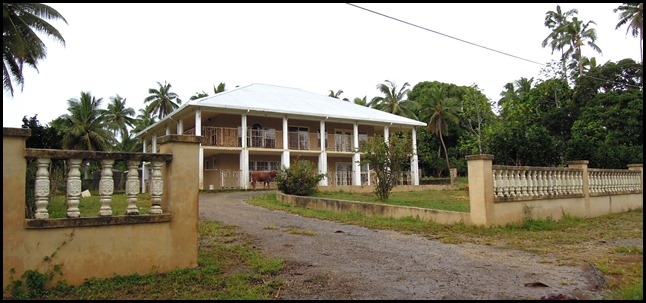 Nearing the airport we saw a cow. Nothing special per se, but he was standing outside
what back in the day would have been a rather smart
hotel.
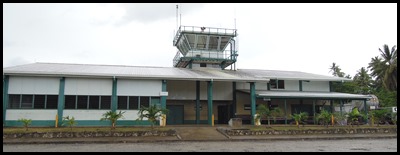 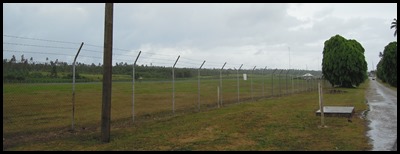 The International
Airport and runway. We know things look more
drab in the rain but this really was.
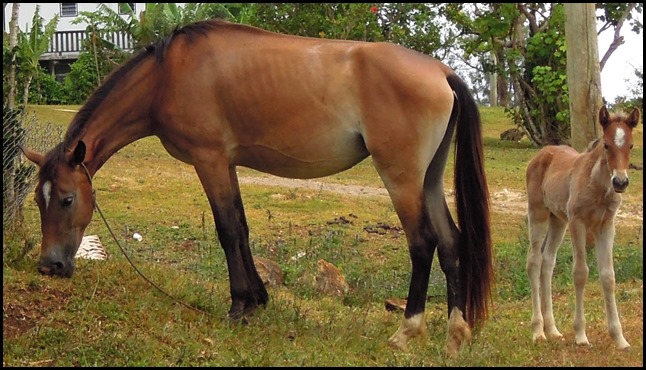 This weeks cutey is a foal.
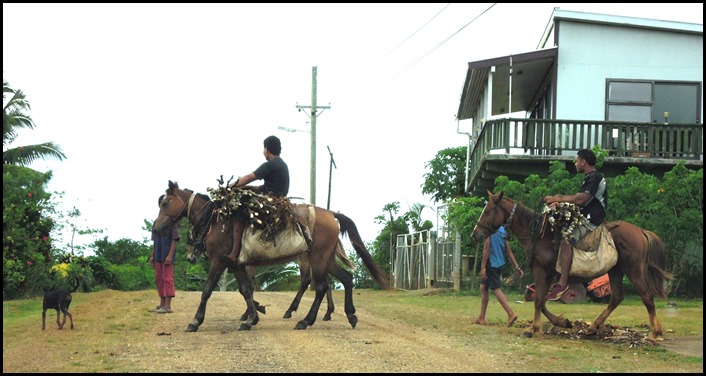 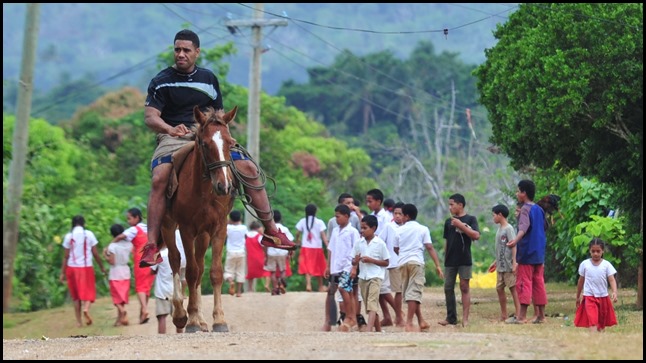 We saw quite a few horses out and about working, a bit of a
surprise.
Rural Tongans rely on plantation and
subsistence agriculture. Coconuts, vanilla beans, and bananas are the major cash
crops. The processing of coconuts into copra and desiccated coconut is the only
significant industry. Pigs and poultry are the major types of livestock. Horses
are kept for draft purposes, primarily by farmers working their api. More cattle
are being raised, and beef imports are declining.
According to the CIA World Factbook,
“The Tongan economy's base is agriculture, which contributes 30% to GDP. Squash,
coconuts, bananas, and vanilla beans are the main crops, and agricultural
exports make up two-thirds of total exports. The country must import a high
proportion of its food, mainly from New Zealand. The industrial sector accounts
for only 10% of GDP. Tourism is the primary source of hard currency earnings.
The country remains dependent on sizable external aid and remittances to offset
its trade deficit. The government is emphasising the development of the private
sector, especially the encouragement of investment.” The GDP per capita in 2011
was $7,500.
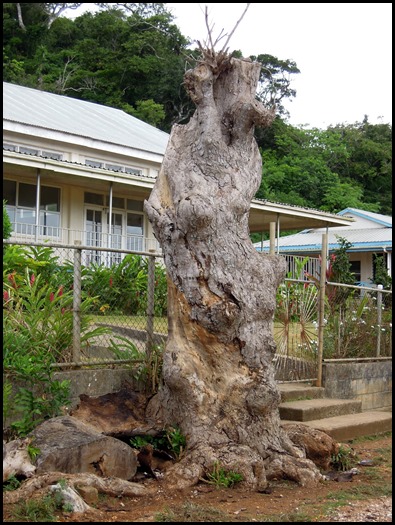 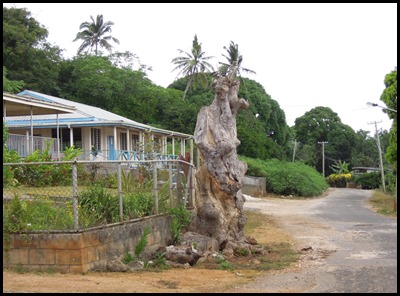 Bear liked this
tree, don’t ask, I didn’t, but it did stand outside the smartest house we found all day.
 Schools were all very smart, this is
the high school just outside town.
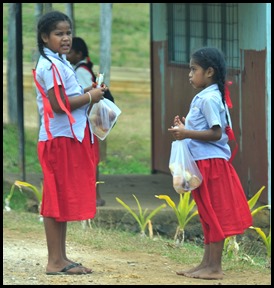
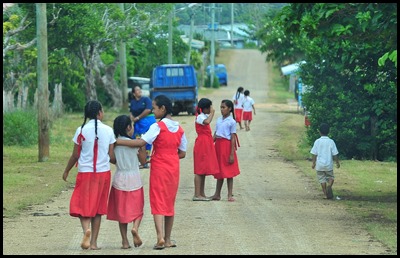 School
uniform is also very neat.
 Lunch was a
crowded affair. It has to be said we are now in low season, very few
visiting yachts are still here, but, of course, Beez Neez does like to be at the
back. The businesses here in Vava’u change hands all the time and many are up
for sale, closed for the season or simply boarded up. One bar, announced on the
eight thirty radio net, that they were pleased to announce they had been open
for three months, we wish them well and will see if they are still trading when
we visit next year.....watch this space.
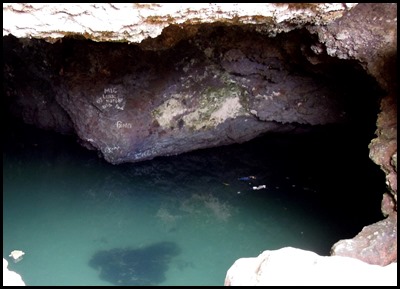
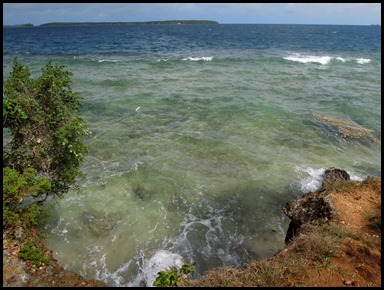 It is said that Vei, a beautiful
woman, would sit at the entrance to the cave and brush her long locks. A tevolo
(mischievous spirit) named Muni lived on the peninsula near the village of
Makave and every afternoon as Vei brushed her hair, Muni would gaze longingly
across the water at her, but he knew that if he attempted to reach her, she
would vanish as soon as he started on the long journey in her direction. So one
day, in order to trick Vei, Muni - who was weeding his garden with a huo-epu
(hoe), took off his white hat, put it on the hoe and balanced it in the middle
of his garden. When Vei looked up, she would think that the tevolo was still
busy. As she sat at the entrance to the cave, teasingly brushing her gorgeous
hair, Muni snuck up on her from behind a futu tree and grabbed her by the hair.
Vei begged for her life and invited him down to her dwelling place. When they
entered the water, she took a deep breath, dived in and filled her mouth with
water.
During her escape she was questioned
by two tevolo, Sisi and Fainga’a and some of the water in her mouth spouted out.
The underground wells of Toula resulted, they are renowned for the purity of
water and the ease with which the water can be assessed, by digging just six
feet down. Vei was also tickled at this place and now it is called called
Vai’ine after her.
Vei continued her escape through the
Neiafutahi sea-wall, she rested here and the result was the fresh water spring
called ‘Tufu. On she went to Falaleu village to the western side of the Port of
Refuge Harbour, she slipped and her half open mouth spilt a little more water –
the spring Vei-ngangana (Vei’s dropped water) was the result.
Vei continued along the sea wall to
Mount Talau, Vaipu inlet and Maitaika. Here she rested for a while The brackish
water of ‘Tufutele was where many locals bathed and did their washing. Not pure
water as she didn’t spill any from her mouth here.
Finally, Vei found a new and final
resting place toward Taoa and Tefisi villages, now called ‘Vei Siale (final
destiny). It may be a sweet little story but we didn’t fancy her original cave or the bay
across which she made her escape, so, back in the car and onward.
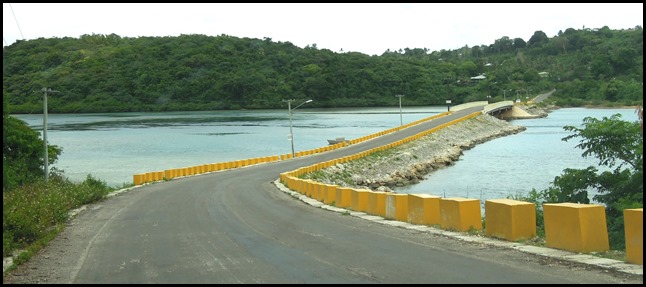 We went over a
bridge paid for by the Chinese and drove through a couple of villages who
had new water pipes, the money donated by the people of
Japan.
ALL IN ALL A MIXED
BAG
A GOOD DAY
OUT |